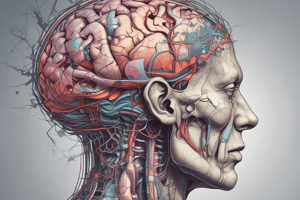Podcast
Questions and Answers
What is the primary goal of the secondary assessment in emergency care?
What is the primary goal of the secondary assessment in emergency care?
- To determine the underlying cause of the patient's condition
- To assess the patient'smentation and check for obvious head or spinal cord lesions
- To enable decisions regarding definitive therapy, prognosis, and patient management options (correct)
- To prioritize patients based on the severity of their condition
During a comprehensive clinical examination, which of the following systems should be assessed?
During a comprehensive clinical examination, which of the following systems should be assessed?
- Respiratory, cardiovascular, abdomen, urinary, nervous, pelvis, perineum, and retroperitoneal space (correct)
- Respiratory and urinary systems only
- Respiratory, cardiovascular, and abdomen only
- Cardiovascular, abdomen, and nervous systems only
What should be done immediately if a patient presents with extreme alterations in mentation?
What should be done immediately if a patient presents with extreme alterations in mentation?
- Prioritize the patient based on the severity of their condition
- Check for obvious head or spinal cord lesions
- Perform a comprehensive clinical examination
- Determine and treat the underlying cause (correct)
Why is it essential to consider metabolic causes during a central nervous system evaluation?
Why is it essential to consider metabolic causes during a central nervous system evaluation?
What is the primary focus of triage prioritization?
What is the primary focus of triage prioritization?
What should be included in a thorough neurological assessment?
What should be included in a thorough neurological assessment?
Why is it essential to assess the patient's respiratory system during a comprehensive clinical examination?
Why is it essential to assess the patient's respiratory system during a comprehensive clinical examination?
What is a critical step in planning emergency treatment?
What is a critical step in planning emergency treatment?
What is the primary purpose of using the 'A CRASH PLAN' mnemonic in clinical examination?
What is the primary purpose of using the 'A CRASH PLAN' mnemonic in clinical examination?
Which component of the 'A CRASH PLAN' mnemonic is related to cardiovascular evaluation?
Which component of the 'A CRASH PLAN' mnemonic is related to cardiovascular evaluation?
What is the significance of remembering that if everything seems normal, something may have been overlooked during a clinical examination?
What is the significance of remembering that if everything seems normal, something may have been overlooked during a clinical examination?
Which of the following is NOT a component of the 'A CRASH PLAN' mnemonic?
Which of the following is NOT a component of the 'A CRASH PLAN' mnemonic?
What is the primary focus of the 'R' component in the 'A CRASH PLAN' mnemonic?
What is the primary focus of the 'R' component in the 'A CRASH PLAN' mnemonic?
Which of the following is a component of the 'A CRASH PLAN' mnemonic related to neurological assessment?
Which of the following is a component of the 'A CRASH PLAN' mnemonic related to neurological assessment?
What is the primary focus of primary assessment in emergency care?
What is the primary focus of primary assessment in emergency care?
In what order is the primary assessment typically performed?
In what order is the primary assessment typically performed?
What is the main reason for assessing the airway before proceeding to the next step?
What is the main reason for assessing the airway before proceeding to the next step?
Why is it essential to record the primary assessment in writing?
Why is it essential to record the primary assessment in writing?
What is the primary goal of primary assessment in emergency care?
What is the primary goal of primary assessment in emergency care?
What is the correct sequence of primary assessment in emergency care?
What is the correct sequence of primary assessment in emergency care?
Flashcards are hidden until you start studying
Study Notes
Central Nervous System Evaluation
- Assess mentation: extreme alterations (stupor, coma, or seizures) require immediate determination and treatment of underlying cause
- Check for obvious head or spinal cord lesions
- Consider metabolic causes (e.g., hypoglycemia) and increased intracranial pressure
Primary Assessment
- Purpose: rapid evaluation of the patient's ABCD (Airway, Breathing, Circulation, and Disability)
- Performed in a sequential and recorded manner
- Focus on identifying optimal medical treatments for stabilization
Order and Importance of Assessment
- Assessment performed in a strictly prescribed order
- No body system examined without addressing the needs of the previous system
- Ensures detection and elimination of airway obstructions before proceeding
Comprehensive Clinical Examination
- Areas to assess thoroughly:
- Respiratory system
- Cardiovascular system
- Abdomen
- Urinary system and urinary output
- Nervous system (neurological examination)
- Pelvis, perineum, and retroperitoneal space
- Limbs
Mnemonic for Comprehensive Examination
- "A CRASH PLAN" ensures nothing is overlooked during a clinical examination:
- A = Airway, breathing, bleeding
- C = Circulation, cardiovascular
- R = Respiration
- A = Abdomen (analgesic)
- S = Spine
- H = Head
- P = Pelvis, perineum, penis
- L = Limbs
- A = Arteries/veins
- N = Nerves/neurologic
Importance of Checking Everything
- It is crucial to remember that if everything seems normal, something may have been overlooked
- Conducting a thorough examination is essential for a comprehensive evaluation of the animal's health
Studying That Suits You
Use AI to generate personalized quizzes and flashcards to suit your learning preferences.




